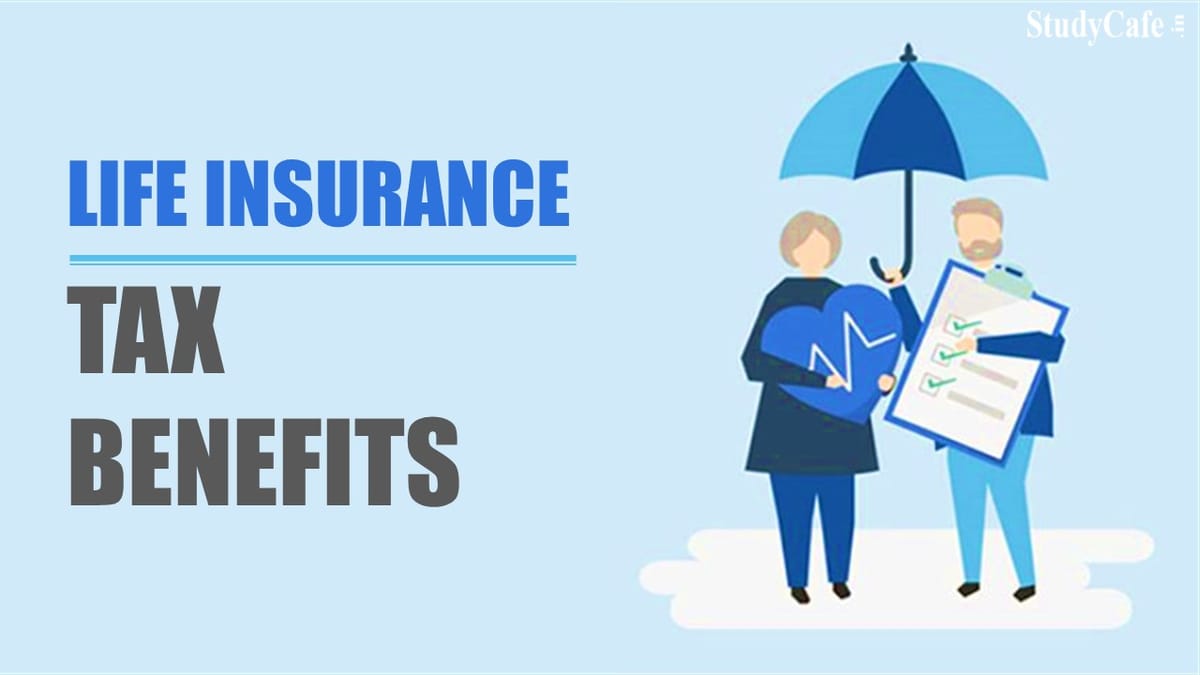CA Balwant Jain | Aug 9, 2022 |

Tax Benefits on Life Insurance
Tax laws allow certain tax benefits for premiums paid for life insurance policies as well as in respect of money received from life insurance companies. Let us discuss.
An individual whether a resident of non-resident and an HUF can claim a deduction for life insurance premium paid under Section 80C up to Rs. 1.50 lakh every year. This deduction is available along with other eligible items like PPF, NSC, ELSS, home loan repayment, tuition fee paid, provident fund contribution etc. Deduction for life insurance premium paid is upto 10% of the sum assured and for any premium paid over 10% the deduction is not available. However, in case the policy is taken for a handicapped person or one suffering from critical illness the premium upto 15% is allowable.
An individual can claim this deduction for his own life insurance policy as well as of his/her spouse. The deduction is also available for premium paid for any child of the Individual whether financially dependent or not. So the non-earning parents who are senior citizens and do not have many items available for deduction under Section 80C except tax saving FD, NSC, and deposits under Senior Citizen Saving Scheme can pay the premium for their earning children to optimize the tax outgo, whose limit of Section 80C in all likelihood gets exhausted earlier due to mandatory payments like PF, tuition fee and home loan repayment.
This deduction is available for all types of life insurance policies like term plans, whole life policies, endowment plans and Unit Linked Polices(ULIPs) subject to the cap of 10% of the sum assured.
The money received from the insurance company at the time of death of the policyholder is fully tax-free under Section 10(10D) for all types of insurance policies including single premium policies and ULIPs.
However, in respect of money received otherwise than on death, it is exempt only if the premium for the policy did not exceed 10% of the sum assured for any of the years during the premium paying term for all policies issued after 1-4-2012. However, for policies issued for handicapped persons or those suffering from critical illness a higher threshold of 15% is provided. For the policies issued between 1-4-2003 and 31st March 2012, a higher percentage of 20% is allowed. The money received in respect of policies issued prior to 1st April 2003 is fully tax exempt.
For single premium policies the premium paid in all the probability would be more than 10% of the sum assured so the deduction under Section 80C would be restricted to 10% of the sum assured in the year of payment. Since exemption under Section 10(10D) is available only if the premium paid does not exceed 10% of the sum assured, the money received under a single premium policy otherwise than as a death claim would not be tax exempt in case the premium paid exceeds 10% of the sum assured.
It may be noted that the entire money received on maturity of such policies would not be taxable but only the difference between the premium paid and money received can be taxed. Income tax law does not have any specific rules on how the profits on such life insurance policies are to be taxed. In my opinion, the premium paid can be treated as an investment and if the policy ran for more than 36 months, the same can be treated as an investment and only the indexed gain can be taxed at a flat 20%.
The money received from the insurance company is tax-free for all ULIP policies issued prior to 1st February 2021 provided the premium paid did not exceed 10%/15% of the sum assured for any of the premium paying terms. However, the ULIP policies issued after 1st February 2021 will not enjoy this exemption if the premium paid for such policies for any of the years exceeded 2.50 lakhs during the year.
The same would be taxed as listed shares/units of equity-oriented schemes and the difference will be taxed at a flat rate of 10% after an initial one lakh if the equity component in the scheme was at least a minimum of 65% for all the years. If the ULIP did not have this minimum 65% of equity holding during the entire tenure, the difference would be treated like a single premium policy as discussed earlier.
Balwant Jain is a tax and investment expert and can be reached at jainbalwant@gmail.com and @jainbalwant on Twitter.
In case of any Doubt regarding Membership you can mail us at contact@studycafe.in
Join Studycafe's WhatsApp Group or Telegram Channel for Latest Updates on Government Job, Sarkari Naukri, Private Jobs, Income Tax, GST, Companies Act, Judgements and CA, CS, ICWA, and MUCH MORE!"